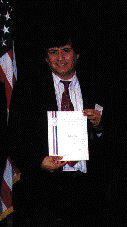
Spring/Summer 1999
Volume 6, Issue 2
Spring/Summer 1998
Volume
3, Issue 1
January 1995
Volume
2, Issue 4
October 1994
Volume
2, Issue 1
January 1994
Tapia Gives Keynote Address at White House Mentoring Award Symposium
 Richard Tapia won a Presidential Award for Excellence in Science, Mathematics, and Engineering Mentoring in 1996. He delivered the keynote address at this year's awards ceremony. |
"Mentoring will become increasingly important in this post-affirmative action era if we are to prepare not only the quantity, but also the quality of students the country needs to solve the critical lack of minority leadership at the national level," Tapia said in his address.
The presidential mentoring awards are an outgrowth of goals set in 1994 as part of the Clinton Administration's science policy blueprint, "Science in the National Interest." The goals are to produce the best-trained scientists and engineers for the 21st century and to enhance the scientific and technological literacy of all Americans. The awards recognize outstanding individual efforts and organizational programs designed to increase the participation of underrepresented groups in mathematics, engineering, and science in kindergarten-12th grade and through the graduate level.
"Just as the awarding of the Nobel Prize ensures that we honor major accomplishments in science, this mentoring award helps ensure that we will have a well-trained workforce in science, mathematics, and engineering and citizens well prepared for the challenges of the 21st century," said NSF Director Rita Colwell.
Tapia was honored with a presidential mentoring award in September 1996. He was recognized for his contributions to the mentoring of students who have been underrepresented in science, math, and engineering fields. Tapia initiated and directs the CRPC outreach programs at Rice University. These programs have, in less than 10 years, trained and encouraged hundreds of teachers to pursue or interest students in mathematics and science careers, especially underrepresented minorities and women.
The award also credited Tapia's role as associate director for minority affairs in the Office of Graduate Studies at Rice. Tapia's efforts have helped CAAM lead the nation in graduating women and minority Ph.Ds. Since he joined Rice in 1970, Tapia has been responsible for increasing the number of women and minorities studying mathematics and science at the university.
All of Tapia's contributions have been inspired by his conviction that "no first-world nation can maintain the health of its economy or society when such a large part of its population remains outside all scientific and technological activity."
Up to 10 individuals and 10 institutions annually may qualify for the award, which includes a $10,000 grant and a commemorative presidential certificate. Tapia's 1996 grant was used to further enhance mentoring efforts at Rice. His program incorporated community building, or forming a cohesive social and professional body of students; mentoring; intervention to help solve personal or academic problems that would keep minority students from pursuing their degrees; and professional development, such as encouraging students give talks in their disciplines and in the area of general diversity. Six women and three underrepresented minorities were granted Ph.D.s in CAAM during the grant period. More than 30 graduate minority students participated in program activities.
For more information, see http://www.nsf.gov/od/lpa/news/press/pr9849.htm.